|
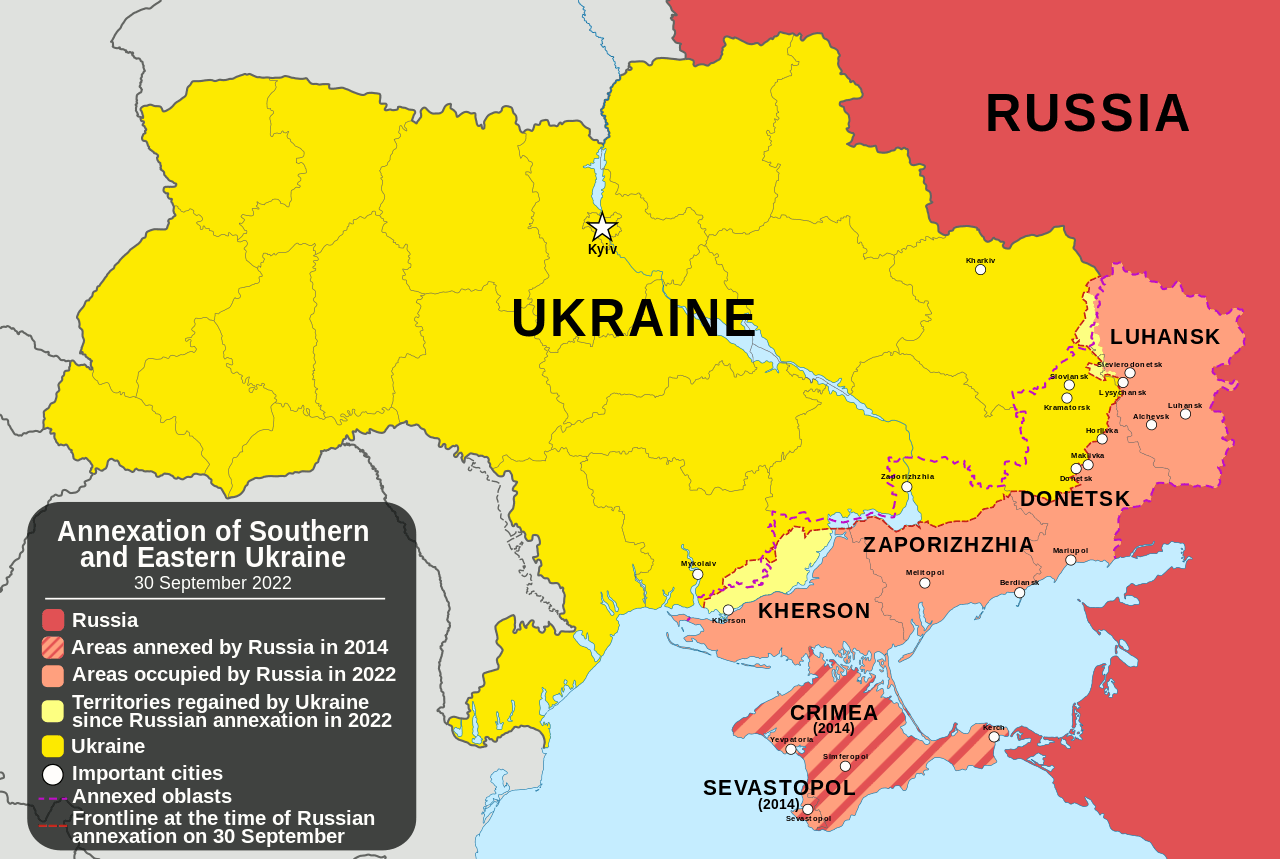
2024
WAR IN UKRAINE A third of Russia's war ships in the Black Sea have been either sunk or disabled by Kyiv's forces since the war began just over two years ago, according to Ukraine's navy.
The figures came from Ukrainian navy spokesperson Captain Dmytro Pletenchuk after Kyiv claimed to have struck four Russian vessels with domestically built
Neptune missiles in a single day in annexed
Crimea - the Russian amphibious landing ship Kostantin Olshansky, two of Russia's large landing ships, the Yamal and the Azov, and Russia's reconnaissance ship Ivan Khurs.
The most high-profile loss suffered by Moscow in the war so far. Ukraine said it struck and sunk the Moskva cruiser, Russia's Black Sea flagship, with two Neptune missiles on April 14, 2022.
The Kremlin sought to downplay the loss, telling reporters that the vessel, which had roughly 500 personnel, "lost its stability due to damage to the hull received during the fire from the detonation of ammunition[...]during the towing of the Moskva cruiser to the port of destination."
"In the conditions of stormy seas, the ship sank," the Kremlin told state media.
Kyiv's forces reportedly sank the ship on March 24, 2022 with a Soviet Tochka-U ballistic missile while it was docked in Berdiansk in Ukraine's occupied Zaporizhzhia region. Russia only admitted the loss of Saratov on the 1-year anniversary of the ship's destruction.
Five Raptor-class patrol boats (three destroyed, two damaged)
Ukraine has destroyed three Russian Raptor-class patrol ships and damaged a further two since the war began, the Oryx open-source intelligence outlet has visually confirmed.
Two of these were destroyed with a Ukrainian Bayraktar drone in May 2022 near Zmiinyi (Snake) Island in the
Black
Sea, then Chief of General Staff Valeriy Zaluzhniy said at the time.
The high-speed patrol boats are capable of engaging in search-and-rescue, anti-sabotage, and anti-terrorism operations.
One Project 02510 BK-16E high-speed assault boat (destroyed)
According to Oryx, the vessel was destroyed on May 2, 2022. Russian state-run media notes that the high-speed assault boat can be used to provide fire support for a landing party, participate in anti-saboteur measures, fight piracy and terrorism, carry light cargoes and take part in rescue operations.
Vasily Bekh, Project 22870 rescue tug (destroyed)
Kyiv's military said it struck the Vasily Bekh tugboat in the Black Sea with two
Harpoon missiles in June 2022. Ukraine's Armed Forces Strategic Communications Directorate released a video that appeared to show the attack.
Ivan Golubets, Project 266M Natya-class minesweeper (damaged)
The Russian Defense Ministry said in October 2022 that the minesweeper Ivan Golubets was damaged during a "massive attack" involving drones on the port city of Sevastopol in Crimea. The operation was conducted with nine Ukrainian unmanned aerial vehicles, and seven "maritime drones," Moscow said.
One Project 640 small patrol boat (destroyed)
The vessel was destroyed with a Ukrainian Bayraktar drone in the northwestern part of the Black Sea in September 2023 as it was unloading equipment, according to Oryx. A video published on social media appears to show the moment of impact.
Three Ropucha-class landing ships (Minsk damaged beyond economical repair, Olenegorsky Gornyak and another damaged)
Oryx visually confirmed attacks on three Ropucha-class landing ships, including the Olenegorskiy Gornyak, which became the second-largest Russian ship to be damaged after the Moskva.
The Minsk was targeted by Ukraine in September 2023 with cruise missiles at the Sevmorzavod shipyard in Sevastopol. The U.K. government assessed the Minsk had "almost certainly been functionally destroyed."
Two Serna-class landing craft (one destroyed, one damaged)
In November 2023, the Defense Intelligence of the Ministry of Defense of Ukraine published footage showing Ukrainian naval drones targeting small Russian landing boats near Vuzka Bay in the west of Crimea.
Askold, cruise missile carrier corvette (damaged)
The corvette from the 22800 Karakurt-class project cruiser was damaged in a Ukrainian attack on Crimea in November 2023. A photo and video circulating on social media appeared to show the charred remains of the cruise-missile carrier at the Zaliv shipyard.
Ukraine's Center for Strategic Communications reported that the vessel had sustained significant damage and "may be beyond repair."
One Project 1176 Ondatra-class landing craft (damaged)
On November 10, 2023, the Defense Intelligence department of the Ministry of Defense of Ukraine released a video showing how Ukrainian kamikaze boats in the area of Vuzka Bay attacked the ship.
Novocherkassk, Ropucha-class landing ship (destroyed)
In December 2023, Kyiv targeted the vessel with a cruise missile as it was docked at Feodosia in Crimea. A total of 77 sailors were onboard the large landing ship at the time of the attack, Russian-language Telegram channel Astra reported.
Ivanovets, Project 12411 Tarantul-III-class corvette (destroyed)
On February 1, Ukrainian naval drones destroyed Russia's missile-armed corvette Ivanovets near Crimea in a nighttime operation.
Kyiv said its forces also carried out that attack using MAGURA V5 sea drones. Lieutenant General Kyrylo Budanov, head of Ukraine's military intelligence agency, told The War Zone website that the drones "sent it to the bottom of the Black Sea."
Caesar Kunikov, Ropucha-class landing ship (destroyed)
Ukraine said in February that the Caesar Kunikov began to sink after sustaining damage on its left side. Ukraine's intelligence service released a video purportedly showing the moment its forces struck the vessel with MAGURA V5 sea drones off the Crimean Peninsula, near the city of Alupka.
A third of Russia's war ships in the Black Sea have been either sunk or disabled by Kyiv's forces since the war began just over two years ago, according to Ukraine's navy.
The figures came from Ukrainian navy spokesperson Captain Dmytro Pletenchuk after Kyiv claimed to have struck four Russian vessels with domestically built Neptune missiles in a single day in annexed Crimea—the Russian amphibious landing ship Kostantin Olshansky, two of Russia's large landing ships, the Yamal and the Azov, and Russia's reconnaissance ship Ivan Khurs.
Russian President Vladimir Putin visits the destroyer "Vice Admiral Kulakov" on September 23, 2014, in Novorossiysk, Russia. A third of Moscow's warships in the Black Sea have been either sunk or disabled by Kyiv’s forces.
"Our ultimate goal is complete absence of military ships of the so-called Russian Federation in the Azov and Black Sea regions," Pletenchuk said.
Newsweek has contacted Russia's Defense Ministry for comment by email.
Kyiv has targeted Russia's Black Sea Fleet throughout President Vladimir Putin's full-scale invasion of the country, which began in February 2022. Ukraine has vowed to reverse the Russian leader's 2014 annexation of Crimea, which now serves as Moscow's central logistics hub for its forces in southern Ukraine. 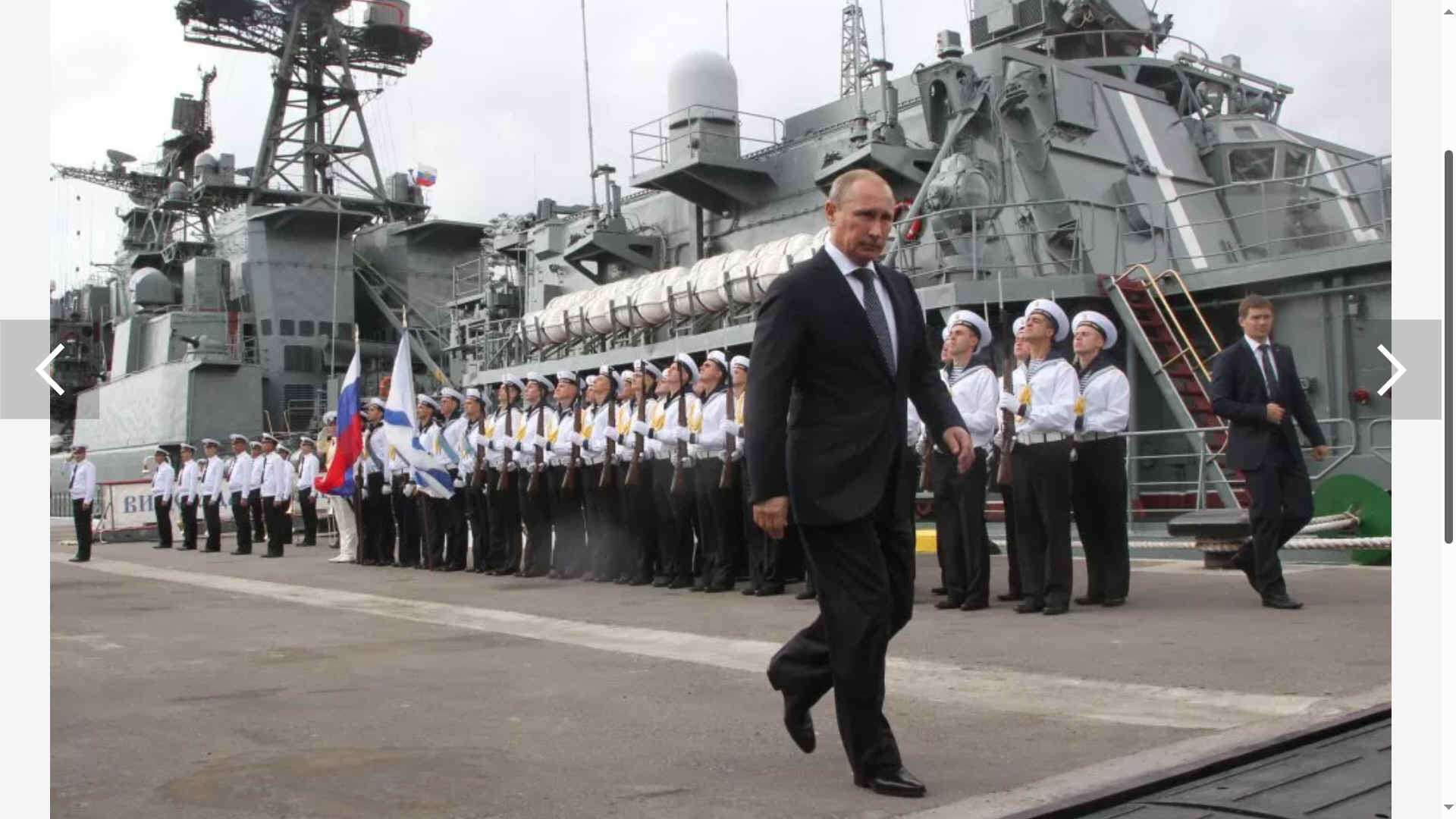
RUSSIAN
SHIPS SUNK OR DISABLED BY UKRAINE
A third of Russia's war ships in the Black Sea have been either sunk or disabled by Kyiv's forces since the war began just over two years ago, according to Ukraine's navy.
Molfar, an open-source intelligence agency, in analysis of Russia's fleet losses between February 24, 2022, to February 15, 2024, reported that a wide range of Putin's naval forces have been targeted in the war, with losses including both small and large ships performing various functions, from amphibious operations to patrolling.
"The most vulnerable turned out to be patrol boats and landing craft, indicating the high effectiveness of Ukrainian defense means," Molfar found. "The losses of large landing ships and frigates diminish the aggressor's capability to conduct large-scale maritime operations, having long-term strategic consequences for the Russian fleet."
Below is a list of the Russian naval vessels reported to have been damaged or destroyed by Ukraine since February 2022.
Moskva, Slava-class guided missile cruiser (destroyed)
The missile cruiser "Moskva," a flagship of Russian Black Sea Fleet, entering the Crimean port of Sevastopol bay on September 10, 2008. Ukraine said it struck and sunk the ship with two Neptune missiles.
The most high-profile loss suffered by Moscow in the war so far. Ukraine said it struck and sunk the Moskva cruiser, Russia's Black Sea flagship, with two Neptune missiles on April 14, 2022.
The Kremlin sought to downplay the loss, telling reporters that the vessel, which had roughly 500 personnel, "lost its stability due to damage to the hull received during the fire from the detonation of ammunition[...]during the towing of the Moskva cruiser to the port of destination."
"In the conditions of stormy seas, the ship sank," the Kremlin told state media.
Saratov, Tapir-class amphibious landing ship (destroyed)
Kyiv's forces reportedly sank the ship on March 24, 2022 with a Soviet Tochka-U ballistic missile while it was docked in Berdiansk in Ukraine's occupied Zaporizhzhia region. Russia only admitted the loss of Saratov on the 1-year anniversary of the ship's destruction.
Five Raptor-class patrol boats (three destroyed, two damaged)
Ukraine has destroyed three Russian Raptor-class patrol ships and damaged a further two since the war began, the Oryx open-source intelligence outlet has visually confirmed.
Two of these were destroyed with a Ukrainian Bayraktar drone in May 2022 near Zmiinyi (Snake) Island in the Black Sea, then Chief of General Staff Valeriy Zaluzhniy said at the time.
The high-speed patrol boats are capable of engaging in search-and-rescue, anti-sabotage, and anti-terrorism operations.
One Project 02510 BK-16E high-speed assault boat (destroyed)
According to Oryx, the vessel was destroyed on May 2, 2022. Russian state-run media notes that the high-speed assault boat can be used to provide fire support for a landing party, participate in anti-saboteur measures, fight piracy and terrorism, carry light cargoes and take part in rescue operations.
Vasily Bekh, Project 22870 rescue tug (destroyed)
Kyiv's military said it struck the Vasily Bekh tugboat in the Black Sea with two Harpoon missiles in June 2022. Ukraine's Armed Forces Strategic Communications Directorate released a video that appeared to show the attack.
Ivan Golubets, Project 266M Natya-class minesweeper (damaged)
The Russian Defense Ministry said in October 2022 that the minesweeper Ivan Golubets was damaged during a "massive attack" involving drones on the port city of Sevastopol in Crimea. The operation was conducted with nine Ukrainian unmanned aerial vehicles, and seven "maritime drones," Moscow said.
One Project 640 small patrol boat (destroyed)
The vessel was destroyed with a Ukrainian Bayraktar drone in the northwestern part of the Black Sea in September 2023 as it was unloading equipment, according to Oryx. A video published on social media appears to show the moment of impact.
Three Ropucha-class landing ships (Minsk damaged beyond economical repair, Olenegorsky Gornyak and another damaged)
One of three Russian navy vessels, a "Ropucha" class large landing ship "Olenegorsky Gornyak" sails through the Bosphorus Strait en route to the Black Sea past the city of Istanbul on February 9, 2022.
Oryx visually confirmed attacks on three Ropucha-class landing ships, including the Olenegorskiy Gornyak, which became the second-largest Russian ship to be damaged after the Moskva.
The Minsk was targeted by Ukraine in September 2023 with cruise missiles at the Sevmorzavod shipyard in Sevastopol. The U.K. government assessed the Minsk had "almost certainly been functionally destroyed."
Two Serna-class landing craft (one destroyed, one damaged)
In November 2023, the Defense Intelligence of the Ministry of Defense of Ukraine published footage showing Ukrainian naval drones targeting small Russian landing boats near Vuzka Bay in the west of Crimea.
Askold, cruise missile carrier corvette (damaged)
The corvette from the 22800 Karakurt-class project cruiser was damaged in a Ukrainian attack on Crimea in November 2023. A photo and video circulating on social media appeared to show the charred remains of the cruise-missile carrier at the Zaliv shipyard.
Ukraine's Center for Strategic Communications reported that the vessel had sustained significant damage and "may be beyond repair."
One Project 1176 Ondatra-class landing craft (damaged)
On November 10, 2023, the Defense Intelligence department of the Ministry of Defense of Ukraine released a video showing how Ukrainian kamikaze boats in the area of Vuzka Bay attacked the ship.
Novocherkassk, Ropucha-class landing ship (destroyed)
In December 2023, Kyiv targeted the vessel with a cruise missile as it was docked at Feodosia in Crimea. A total of 77 sailors were onboard the large landing ship at the time of the attack, Russian-language Telegram channel Astra reported.
Ivanovets, Project 12411 Tarantul-III-class corvette (destroyed)
On February 1, Ukrainian naval drones destroyed Russia's missile-armed corvette Ivanovets near Crimea in a nighttime operation.
Kyiv said its forces also carried out that attack using MAGURA V5 sea drones. Lieutenant General Kyrylo Budanov, head of Ukraine's military intelligence agency, told The War Zone website that the drones "sent it to the bottom of the Black Sea."
Caesar Kunikov, Ropucha-class landing ship (destroyed)
The "Caesar Kunikov," east of the Bulgarian capital Sofia in August 2014. Ukraine said in February 2024 that it began to sink off the Crimean coast after sustaining damage on its left side.
Ukraine said in February that the Caesar Kunikov began to sink after sustaining damage on its left side. Ukraine's intelligence service released a video purportedly showing the moment its forces struck the vessel with MAGURA V5 sea drones off the Crimean Peninsula, near the city of Alupka.
Sergey Kotov, Project 22160 large patrol boat (destroyed)
Five Ukrainian MAGURA V5 naval drones reportedly hit the Sergey Kotov in the Kerch Strait, which separates occupied Crimea from Russia, overnight on March 5.
Ukraine's military intelligence agency (GUR) said the $65-million ship had suffered damage to its stern and on its left and right sides and eventually sank.
Yamal and Azov, Ropucha-class landing ships (damaged)
Kyiv's military said on March 24 that it attacked two of Russia's large landing ships, the Yamal and the Azov, in strikes on the Crimean port city of Sevastopol. Ukraine also said it had targeted a Russian communications hub and other, unspecified infrastructure facilities.
Ivan Khurs, intelligence ship (damaged)
Ukraine claimed to have struck the Ivan Khurs, launched in 2017, in the same strike last weekend. Two missiles struck the vessel, Astra reported, citing anonymous sources.
The ship's tasks include providing communications and fleet control, conducting radio reconnaissance and electronic warfare, and monitoring components of enemy missile defense systems.
The vessel was "likely" damaged, Ukrainian Navy spokesperson Pletenchuk told the United States-backed Radio Free Europe/Radio Liberty.
Kostantin Olshansk, amphibious landing ship (destroyed)
Pletenchuk said the landing ship, which was Ukrainian before being captured by Russia in 2014, "is not combat-capable" following a missile strike.
Ukraine's navy said in a statement on March 26 that Kyiv had "successfully destroyed" the Konstantin Olshansky, and the three other vessels it targeted over the weekend.
Ukraine struck the vessel, which was being "prepared for use against Ukraine," with a home-built Neptune anti-ship missile, Pletenchuk said.
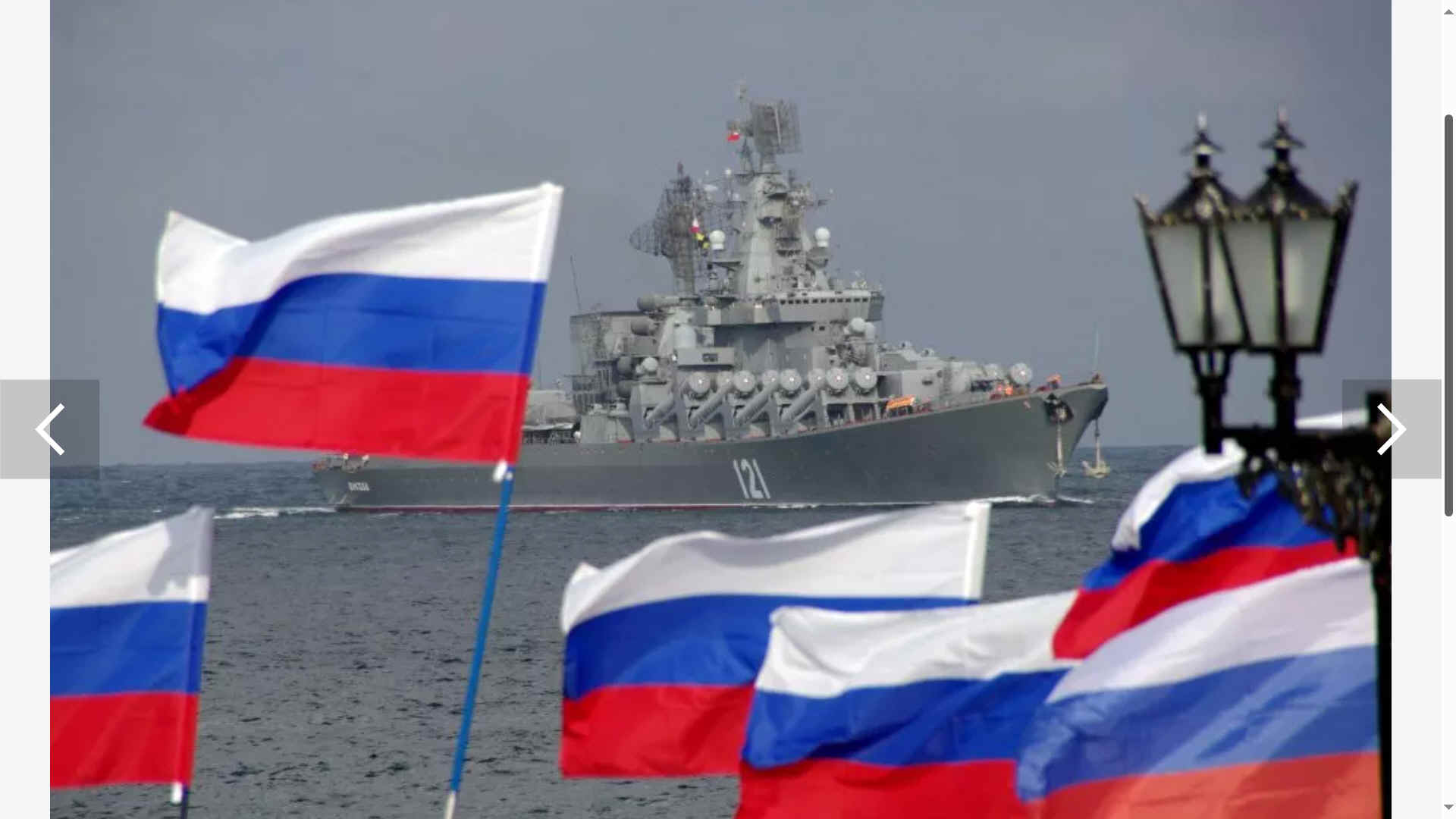
31
JULY 2024 In the past day, Russia has lost up to 1,060 soldiers, 30 artillery systems, 20 armoured combat vehicles, and 9 tanks, according to the latest data reported by the General Staff of the Armed Forces of Ukraine.
The latest report from the General Staff of the Armed Forces of Ukraine, published on Facebook, presented recent losses suffered by the Russian armed forces.
Since 24 February 2022, marking the start of the war, the Russian armed forces have suffered enormous losses in both personnel and equipment.
Russia has lost approximately 578,000 soldiers and military staff, 8,390 tanks, 16,161 armoured combat vehicles, 16,086 artillery systems, 1,131 multiple rocket launch systems, and 2,697 special vehicles and other equipment. 18th
JUNE 2024 Vladimir Putin, Russia’s president, was expected to start a two-day visit to North Korea on the 18th June 2024 in a sign of the countries’ deepening military ties.
As Russia’s war in Ukraine drags on, both sides are firing thousands of artillery shells, missiles and rockets every day. That means that Russia needs ammunition — and North Korea has plenty to offer. For
Kim Jong-un, the North’s leader, things had looked grim until the war in Ukraine created opportunities for him. He traveled to Russia in September, touring sensitive space and military facilities during a visit that underscored Russia’s ability to provide the sort of technology North Korea has long coveted. Putin has indicated that Russia could help North Korea launch spy satellites, which Kim wants to use to monitor military targets. Both
Moscow and Pyongyang deny that they are engaged in arms trading, which is banned under U.N. sanctions.
Background: Putin last visited North Korea in 2000, when he became the first Russian leader to travel there.
Russia, or the Russian Federation, is a country spanning Eastern Europe and North Asia. It is the largest country in the world by area, extending across eleven time zones and sharing land borders with fourteen countries. It is the world's ninth-most populous country and Europe's most populous country. The country's capital as well as its largest city is Moscow. Saint Petersburg is Russia's second-largest city and cultural capital. Other major cities in the country include Novosibirsk, Yekaterinburg, Kazan, Krasnoyarsk, Nizhny Novgorod, Chelyabinsk, Ufa and Samara.
The East Slavs emerged as a recognised group in Europe between the 3rd and 8th centuries CE. The first East Slavic state, Kievan Rus', arose in the 9th century, and in 988, it adopted Orthodox Christianity from the Byzantine Empire. Rus' ultimately disintegrated, with the Grand Duchy of Moscow growing to become the Tsardom of Russia. By the early 18th century, Russia had vastly expanded through conquest, annexation, and the efforts of Russian explorers, developing into the Russian Empire, which remains the third-largest empire in history. However, with the Russian Revolution in 1917, Russia's monarchic rule was abolished and eventually replaced by the Russian SFSR—the world's first constitutionally socialist state. Following the Russian Civil War, the Russian SFSR established the Soviet Union with three other Soviet republics, within which it was the largest and principal constituent. At the expense of millions of lives, the Soviet Union underwent rapid
industrialization in the 1930s and later played a decisive role for the Allies in World War II by leading large-scale efforts on the Eastern Front. With the onset of the Cold War, it competed with the United States for global ideological influence. The Soviet era of the 20th century saw some of the most significant Russian technological achievements, including the first human-made satellite and the first human expedition into outer space.
In 1991, the Russian SFSR emerged from the dissolution of the Soviet Union as the independent Russian Federation. A new constitution was adopted, which established a federal semi-presidential system. Since the turn of the century, Russia's political system has been dominated by Vladimir Putin, under whom the country has experienced democratic backsliding and a shift towards authoritarianism. Russia has been militarily involved in a number of conflicts in former Soviet states and other countries, including its war with Georgia in 2008 and annexation of Crimea in 2014 from neighbouring Ukraine, followed by the further annexation of four other regions in 2022 during an ongoing invasion.
Internationally, Russia ranks among the lowest in measurements of democracy, human rights and freedom of the press; the country also has high levels of perceived corruption. The Russian economy ranks 11th by nominal GDP, relying heavily on its abundant natural resources, and 68th by GDP per capita. Its mineral and energy sources are the world's largest, and its figures for oil production and natural gas production rank highly globally. Russia possesses the largest stockpile of nuclear weapons and has the third-highest military expenditure. The country is a permanent member of the United Nations Security Council; a member state of the G20, SCO, BRICS, APEC, OSCE, and WTO; and the leading member state of post-Soviet organisations such as CIS, CSTO, and EAEU/EEU. Russia is home to 30
UNESCO
World Heritage
Sites.
WORLD WAR TWO
The Soviet Union entered World War II on 17 September 1939 with its invasion of Poland, in accordance with a secret protocol within the Molotov–Ribbentrop Pact with Nazi Germany. The Soviet Union later invaded Finland, and occupied and annexed the Baltic states, as well as parts of Romania. On 22 June 1941, Germany invaded the Soviet Union, opening the Eastern Front, the largest theater of
World War
II.
Eventually, some 5 million Red Army troops were captured by the Nazis; the latter deliberately starved to death or otherwise killed 3.3 million Soviet POWs, and a vast number of civilians, as the "Hunger Plan" sought to fulfil Generalplan
Ost. Although the Wehrmacht had considerable early success, their attack was halted in the Battle of Moscow. Subsequently, the Germans were dealt major defeats first at the Battle of Stalingrad in the winter of 1942–1943, and then in the Battle of Kursk in the summer of 1943. Another German failure was the Siege of Leningrad, in which the city was fully blockaded on land between 1941 and 1944 by German and Finnish forces, and suffered starvation and more than a million deaths, but never surrendered. Soviet forces steamrolled through Eastern and Central Europe in 1944–1945 and captured Berlin in May 1945. In August 1945, the Red Army invaded Manchuria and ousted the Japanese from Northeast Asia, contributing to the Allied victory over Japan.
The 1941–1945 period of World War II is known in Russia as the Great Patriotic War. The Soviet Union, along with the United States, the United Kingdom and China were considered the Big Four of Allied powers in World War II, and later became the Four Policemen, which was the foundation of the
United Nations Security Council. During the war, Soviet civilian and military death were about 26–27 million, accounting for about half of all World War II casualties.
The Soviet economy and infrastructure suffered massive devastation, which caused the Soviet famine of 1946–1947. However, at the expense of a large sacrifice, the Soviet Union emerged as a global superpower.
COLD WAR
After World War
II, according to the Potsdam Conference, the Red Army occupied parts of Eastern and Central Europe, including East Germany and the eastern regions of Austria. Dependent communist governments were installed in the Eastern Bloc satellite states. After becoming the world's second nuclear power, the Soviet Union established the Warsaw Pact alliance, and entered into a struggle for global dominance, known as the
Cold
War, with the rivalling United States and NATO.
INVASION OF UKRAINE
In early 2014, following a revolution in Ukraine, Russia occupied and annexed Crimea from neighbouring Ukraine following a disputed referendum, then used Russian mercenaries and military forces, supported by local separatist militias, to start a war in the Donbas region of eastern Ukraine where most of the inhabitants wanted to stay in Ukraine. In a major escalation of the conflict, Russia launched a full-scale invasion of Ukraine on 24 February 2022. The invasion marked the largest conventional war in Europe since World War II, and was met with international condemnation, as well as expanded sanctions against Russia.
As a result, Russia was expelled from the Council of Europe in March, and was suspended from the
United Nations Human Rights Council in April. In September, following successful Ukrainian counteroffensives, Putin announced a "partial mobilisation", Russia's first mobilisation since World War II. By the end of September, Putin proclaimed the annexation of four Ukrainian regions, the largest annexation in Europe since World War II. Putin and Russian-installed leaders signed treaties of accession, internationally unrecognized and widely denounced as illegal, despite the fact that Russian forces have been unable to fully occupy any of the four regions. A number of supranational and national parliaments passed resolutions declaring Russia to be a state sponsor of terrorism. In addition, Russia was declared a terrorist state by Latvia, Lithuania and Estonia. Hundreds of thousands are estimated to have been killed as a result of the invasion. The war in Ukraine has further exacerbated Russia's demographic crisis.
In June 2023, the Wagner Group, a private military contractor fighting for Russia in Ukraine, declared an open rebellion against the Russian Ministry of Defense, capturing Rostov-on-Don, before beginning a march on Moscow. However, after negotiations between Wagner and the Belarusian government, the rebellion was called off. 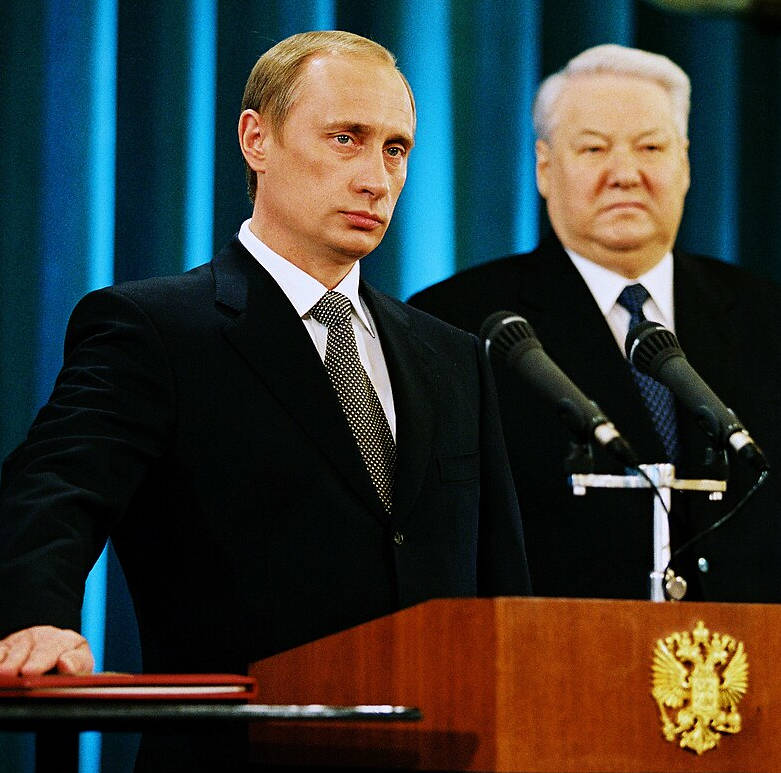
WORLD
WAR THREE We
are on the brink of WWIII. Solutions
are not to purchase fossil
fuels from the CRINKs. And that includes India, who is refining oil
and supplying to the West to defeat sanctions aimed at stopping Russian's
illegal aggression in Ukraine. Thus, India under Narendra
Modi, might be treated as a proxy CRINK. Other
solutions are to manufacture solar panels and batteries
in NATO
countries. To quickly install wind farms and speed up the infrastructure
necessary for EVs and green
hydrogen for FCEVs,
and ICE
vehicles to run on methanol. World
War Three will be a war to eradicate extremist dictators. Meaning
communism and religious dictators who advocate violence to push their
cause, against the free democratic world and other peace loving religions. It
is possible that may also include taking out Royal families. Especially
those who tolerate and are thus party to corruption
in their country. This of course includes the United Kingdom where the
police are puppets to corrupt councils. A cancer in
society. If
there is going to be a nuclear exchange, we might as well eradicate all of
these evils in one fell swoop. The survivors of any nuclear holocaust
might then build on the ashes of evil, for a sustainable future, where it
is illegal for politicians to lie. A law proposed by the Welsh Senedd. STOP
POLITICIANS DECEPTIONS - CRIMINALIZE LYING It is an old joke: Q. How do you tell if a politician is lying? A. Their lips are moving.
Members of the Senedd, the Welsh parliament, are intent on tackling this age-old problem by bringing in legislation that bans politicians from telling untruths.
If the law comes into force, Wales would be the first country in the world to make lying by politicians a criminal offence.
The former Plaid Cymru leader Adam Price, who is leading the charge against the liars, said that in a world of post-truth politics, populism, disinformation and deep fakes, and with elections taking place in the UK and US this
year [2024], the issue Is vital.
“The public are rightly tired of seeing certain politicians lie with impunity,” he said. “It is not enough for us as lawmakers to throw up our hands in disgust. We have the power to change the rules so all politicians act with integrity, honesty and respect.”
Price has been campaigning on truth and trust in politics since the mid 2000s when he tried to impeach
Tony Blair over the Iraq
war, and then being given a knighthood.
That's the UK rewarding lying. Part of the problem, deep seated corruption
in politics right up to the top.
He said: “Then it was almost laughed out of court with comments such as: ‘There aren’t prisons big enough’. I think over the course of two decades it’s come from the margins to be seen as a serious proposition. A
fictional example of which would see Putin in the Gulag, along with all his
warmonger cronies. The same applies to Donald Trump, Boris
Johnson and thousands more politicians who routinely fail to tell it
like it is. Unfortunately, we think that includes most politicians today.
But if there was a law to prevent lying. That would surely make the world a
better place. https://www.msn.com/en-gb/news/uknews/welsh-senedd-members-consider-criminalising-lying-by-politicians/ar-AA1nVBmt https://www.msn.com/en-gb/news/uknews/welsh-senedd-members-consider-criminalising-lying-by-politicians/ar-AA1nVBmt
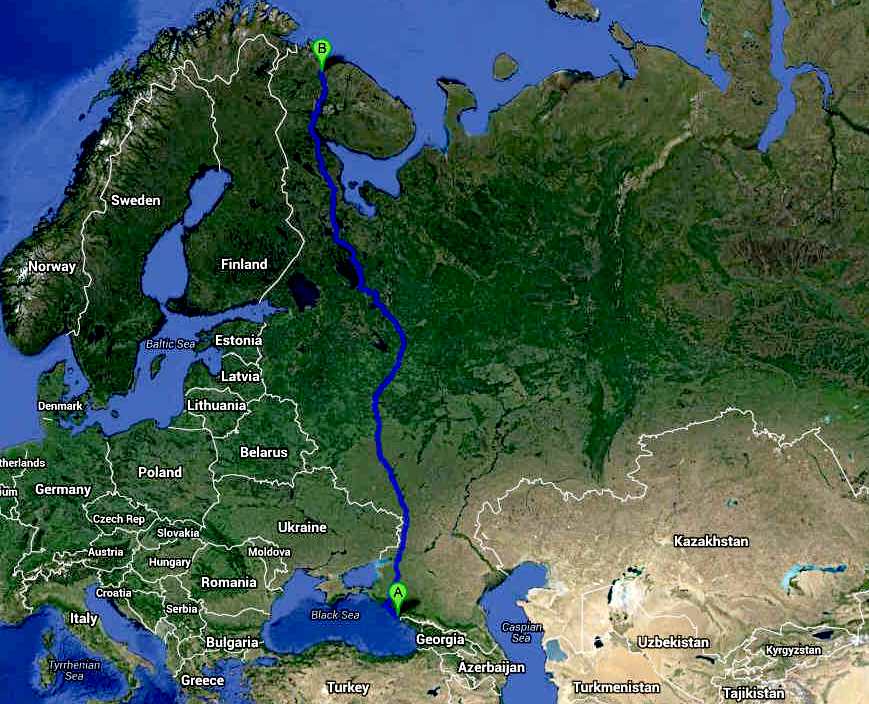
A
new World series of ZEV events from 2015: The Cannonball International series.
Entry to these events are free, provided that the Rules
are followed (for you own safety). The objective is to demonstrate that
transport can be pollution less.
TRANS-RUSSIA
CANNONBALL INTERNATIONAL ZEV RUN STOPS* 50mph
|
START
|
MURMANSK
|
NORTH
|
KMS
|
MILES
|
HOURS*
|
|
1st
STOP
|
Monchegorsk
|
-
|
133
|
83
|
1.66
|
|
2nd
STOP
|
Kandaleksha
|
-
|
242
|
150
|
3.00
|
|
3rd
STOP
|
M18.E105
|
-
|
463
|
288
|
5.76
|
|
4th
STOP
|
M18/E105
|
-
|
547
|
356
|
7.12
|
|
5th
STOP
|
Segezha
|
Republic
Karelia
|
684
|
425
|
8.50
|
|
6th
STOP
|
Medvezhyegorsk
|
Republic
Karelia
|
799
|
496
|
9.92
|
|
7th
STOP
|
Pudozh
|
Republic
Karelia
|
991
|
616
|
12.32
|
|
8th
STOP
|
Vologodskaya
|
Oblast,
Vytegra
|
1,095
|
680
|
13.60
|
|
9th
STOP
|
Lipin
Bor
|
Oblast
|
1,248
|
775
|
15.50
|
|
10th
STOP
|
Vologda
|
Oblast
|
1,417
|
880
|
17.60
|
|
11th
STOP
|
Yaroslavl
|
Oblast
|
1,591
|
988
|
19.76
|
|
12th
STOP
|
Pereslavl-Zalessky
|
Yaroslavl
Oblast
|
1,755
|
1,090
|
21.80
|
|
13th
STOP
|
Moscow
|
-
|
1,867
|
1,160
|
26.98
|
|
14th
STOP
|
Stupino
|
Moskovskaya
O.
|
2,010
|
1,249
|
24.98
|
|
15th
STOP
|
Bogoroditsk
|
Tul'skaya
oblast
|
2,139
|
1,329
|
26.58
|
|
16th
STOP
|
Yelets
|
Lipetskaya
oblast
|
2,292
|
1,427
|
28.54
|
|
17th
STOP
|
Veronezh
|
Oblast
|
2,411
|
1,498
|
29.96
|
|
18th
STOP
|
Pavlovsk
|
Voronezhskaya
O.
|
2,586
|
1,606
|
32.12
|
|
19th
STOP
|
Millerovo
|
Rostov
Oblast
|
2,777
|
1,725
|
34.50
|
|
20th
STOP
|
Rostov-On-Don
|
Rostov
Oblast
|
2,946
|
1,830
|
36.60
|
|
21st
STOP
|
Krasnodar
|
Krasnodar
Krai
|
3,220
|
2,001
|
40.02
|
|
22nd
STOP
|
Tuapse
|
Krasnodar
Krai
|
3,400
|
2,113
|
42.26
|
|
23rd
STOP
|
Golovinka
|
Krasnodar
Krai
|
3,476
|
2,160
|
43.20
|
|
FINISH
|
BOLSHOY
SOCHI
|
SOUTH
|
3,524
|
2,330
|
46.60
|
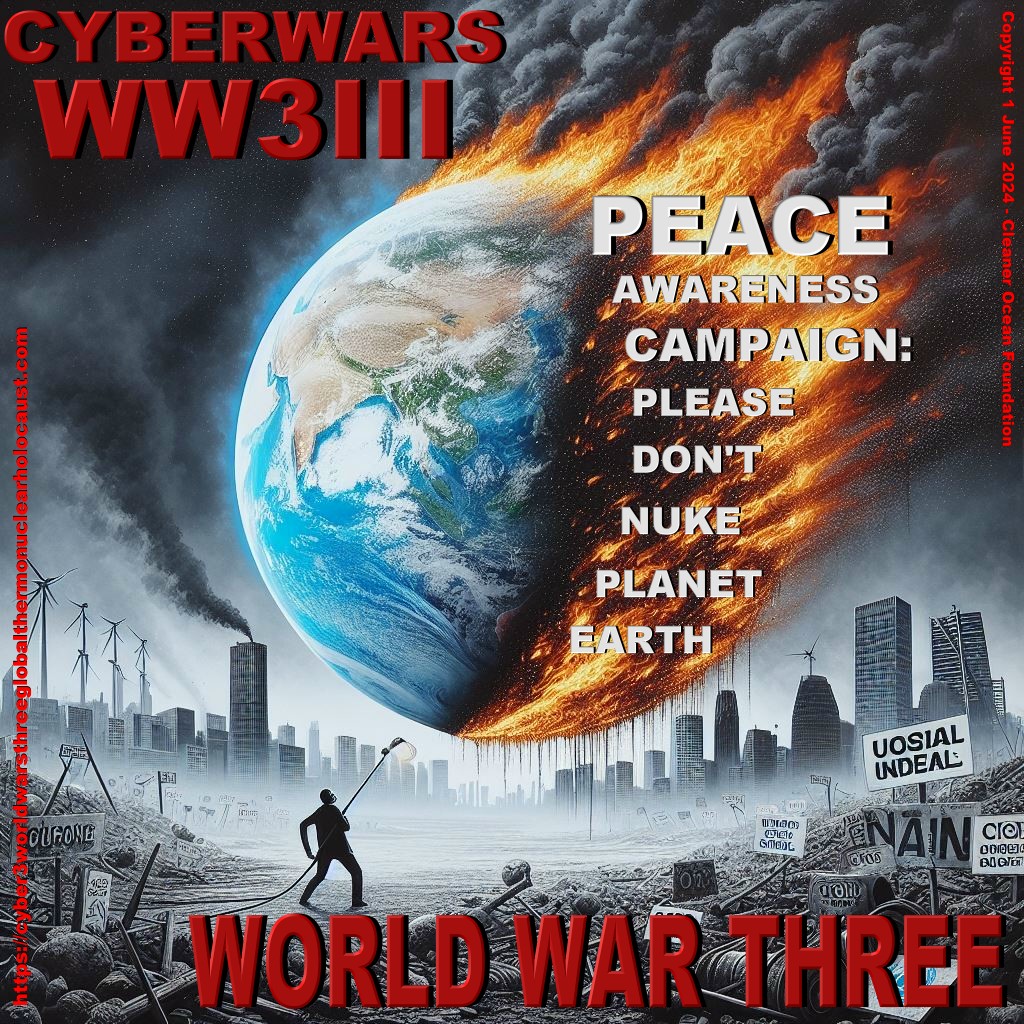
DOOMSDAY
OPERATION GRAND SLAM -
Disillusioned extremists in Iran,
North Korea and Russia,
have grown impatient waiting for their leaders to act decisively, having
watched the Ukraine debacle
of Vladimir Putin rebound to weaken
their CRINK
axis members. This despite Hamas launching against Israel and
Houthi attacks on the Red
Sea. All that had the effect of waking the sleeping giant: NATO.
They
hatch a plot to kidnap top politicians from the west to create confusion, as
a prelude to an all out cyber
nuclear first and second strike, having first stockpiled sufficient gold
and weapons reserves, and fallout bunkers for their cells, to be able to
stage a second wave of conventional attacks, to in effect, take over the
world after the nuclear holocaust they
have engineered. Including assassinating their jaded leaders: Xi
Jinping; Vladimir
Putin, Iranian Grand Ayatollah, Ali
Khamenei, and Kim
Jong Un, supreme leader of communist North
Korea.
Location:
Northern Asia (that part west of the Urals is sometimes
included with Europe), bordering the Arctic
Ocean,
between Europe and the North Pacific Ocean
Geographic
coordinates: 60
00 N, 100 00 E
Map
references:
Asia
Area:
total: 17,075,200 sq km
land: 16,995,800 sq km
water: 79,400 sq km
Area—comparative:
slightly less than 1.8 times the size of the US
Land
boundaries:
total: 19,917 km
border countries: Azerbaijan 284 km, Belarus 959
km, China (southeast) 3,605 km, China (south) 40 km,
Estonia 294 km, Finland 1,313 km, Georgia 723 km,
Kazakhstan 6,846 km, North Korea 19 km, Latvia 217 km,
Lithuania (Kaliningrad Oblast) 227 km, Mongolia 3,441
km, Norway 167 km, Poland (Kaliningrad Oblast) 206 km,
Ukraine 1,576 km
Coastline:
37,653 km
Maritime
claims:
continental shelf: 200-m depth or to the depth of
exploitation
exclusive economic zone: 200 nm
territorial sea: 12 nm
Climate:
ranges from steppes in the south through humid
continental in much of European Russia; subarctic in
Siberia to tundra climate in the polar north; winters
vary from cool along Black Sea coast to frigid in
Siberia; summers vary from warm in the steppes to cool
along Arctic coast
Terrain:
broad plain with low hills west of Urals; vast
coniferous forest and tundra in Siberia; uplands and
mountains along southern border regions
Elevation
extremes:
lowest point: Caspian Sea -28 m
highest point: Mount El'brus 5,633 m
Natural
resources: wide
natural resource base including major deposits of oil,
natural gas, coal, and many strategic minerals, timber
note: formidable obstacles of climate, terrain,
and distance hinder exploitation of natural resources
Land
use:
arable land: 8%
permanent crops: 0%
permanent pastures: 4%
forests and woodland: 46%
other: 42% (1993 est.)
Irrigated
land: 40,000 sq
km (1993 est.)
Natural
hazards:
permafrost over much of Siberia is a major impediment to
development; volcanic activity in the Kuril Islands;
volcanoes and earthquakes on the Kamchatka Peninsula
Environment—current
issues: air
pollution from heavy industry, emissions of coal-fired
electric plants, and transportation in major cities;
industrial, municipal, and agricultural pollution of
inland waterways and sea coasts; deforestation; soil
erosion; soil contamination from improper application of
agricultural chemicals; scattered areas of sometimes
intense radioactive contamination
Environment—international
agreements:
party to: Air Pollution, Air Pollution-Nitrogen
Oxides, Air Pollution-Sulphur 85, Antarctic-Environmental Protocol,
Antarctic
Treaty,
Biodiversity, Climate Change, Endangered
Species,
Environmental Modification, Hazardous Wastes, Law of the
Sea, Marine Dumping, Nuclear Test Ban, Ozone Layer
Protection, Ship Pollution, Tropical Timber 83,
Wetlands, Whaling
signed, but not ratified: Air Pollution-Sulphur
94, Climate Change-Kyoto Protocol
Geography—note:
largest country in the world in terms of area but
unfavorably located in relation to major sea lanes of
the world; despite its size, much of the country lacks
proper soils and climates (either too cold or too dry)
for agriculture
|
Russia
- Youtube
|
Olympic
Bid - Youtube
|
|
Adelaide
Aden
- Yemen
Afghanistan
Africa
Alaska
Albania
Algeria
Amazon
Rainforest
Amsterdam
Antarctic
- Scott
Arctic
North Pole
Argentina
Asia
Athens
Atlantis
- Plato's Lost City
Australia
Austria
Aztecs
- Mexico
Baghdad
Bahamas
Bahrain
Bangladesh
Barbados
Beachy
Head, England
Belgium
Benin
Berlin
Bermuda
Black
Rock Desert
Bohemia
Bolivia Bonneville
Utah History
Bonneville,
Utah, USA
Brazil
Brighton
- West Pier
British
Columbia
Buckingham
Palace
Bulgaria
Burkina
Faso
Burma
California
Canada
Canary
Islands
Cape
Horn
Cape
Verde
Cape
York - Au
Caribbean
Cayman
Islands
Central
Africa
Chichester
Harbour
Chile
China
Columbo
- Sri Lanka
Columbia
Corfu
Cowes,
Isle of Wight
Croatia
Crooked
Island, Bahamas
Cuba
Cyprus
Czechoslovakia
Darwin
- Australia
Daytona
Beach
Denmark
Eastbounre
Pier, England
Earthquakes
Ecuador
Egypt
Eindhoven Estonia
Equator
Europe
Falkland
Islands
Falmouth,
Cornwall
Fiji
Finland
Florida
France
Galapagos
Islands
Geography
Links
Geography
Mountains
Geography
Records
Geography
Resources
Geography
Statistics
|
Germany
Ghana
Gibraltar
- Links
Greece
Greenland
Guinea
Guinea
Bissau
Hawaii
Holland
the Nertherlands
Hollywood,
California, LA
Hong
Kong
Hungary
Hurricanes
Iceland
India
Indonesia
Links
Iran
Iraq
Ireland
Isle
of Man
Isle
of Wight
- The
Needles
Israel
Italy
Ivory
Coast
Jakarta
- Java
Jamaica
Japan
Johannesburg
Jordan
Kent,
England
Kenya
Korea
South Republic
Korea
North
Kuwait
Kyoto
Lanzarote,
Gran Canaria
Las
Vegas
Lebanon
Liberia
Libya
Liechtenstein
Life
on Earth
Lithuania
London
- Big
Ben
London
Eye
London
Houses
Parliament
London
- Buckingham
Palace
London
- Old
Bailey
London
- Overview
London
- The City
London
- Tower Bridge
London
- Trafalgar
Square
Luxembourg
Madame
Tussauds
Malaysia
Mali
Malta
Marshal
Islands
Mauritania
Maya
Empire -
Central America
Melbourne,
Australia
Middle
East
Mexico
Monaco
Morocco
Mountains
Mumbai
Naples-
Italy
National
Geographic
Nepal
New
York
New
Zealand
Niger
Nigeria
North
Africa
Norway
Nova
Scotia
Oceans
and Seas
Oman
Pakistan
Palermo
- Sicily
Palestine
Palma
- Malorca
|
Panama
Canal - Links
Paris
Pendine
Sands
Peru
Philippines
Pisa,
Leaning Tower
Planet
Earth
Poland
Port
Moresby - PNG
Port
Said - Egypt
Portugal
Puerto
Rico
Qatar
Quebec
Rio
de Janeiro
Romania
Rome
Russia
Salt
Lake City
Samoa
Saudi
Arabia
Scandanavia
Scotland
Senegal
Siera
Leone
Singapore
Solomon
Islands
Somalia
South
Africa
South
America
Southampton
Spain
- Espana
Sri
Lanka - Links
Stonehenge
Sudan
Suez
Canal
Sundancer
Holiday Resort
Sussex,
England Index
Sweden
Switzerland
Sydney,
Australia
Syria
Tahiti
- Polynesia
- Links
Tahitian
- Men & Women Customs
Taiwan
Thailand
The
Gambia
Togo
Tokyo,
Japan
Tonga
- Polynesia
Toronto
Trinidad
- Lesser Antilles
Trinidad
and Tobago
Tsunami
Tunbridge
Wells, England
Tunisia
Turkey
Tuvalu
Islands
UAE
- United Arab Emirates
UK
Statistics
Ukraine
United
Kingdom
United
Kingdom -
Gov
USA
Uruguay
Vanuatu
Islands
Vatican
City
Venezuela
Venice
Vienna
Vietnam
Volcanoes
Volendam
Wales
Washington
D.C.
WAYN
Where Are You Now
Wealden
iron industry
Wendover
West
Africa
World
Peace Supporters
Yemen
Yugoslavia
Zurich
|

Solar
Cola drinkers care about planet
earth
..
Thirst for Life

(330ml
Planet Earth can)
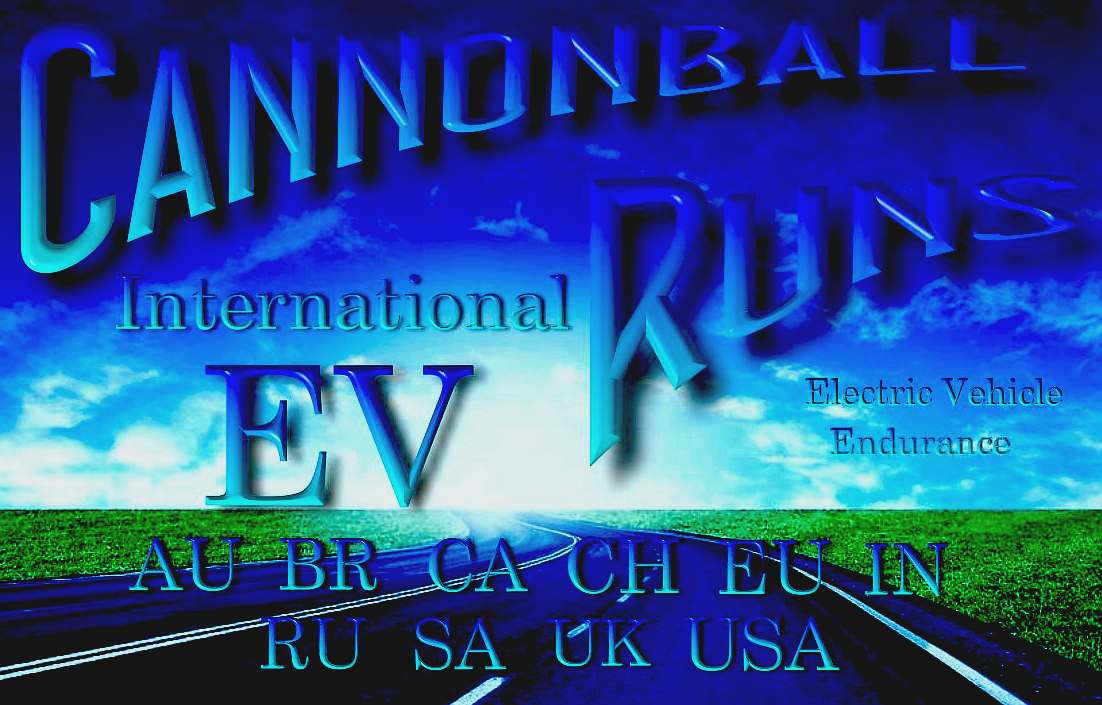
|






